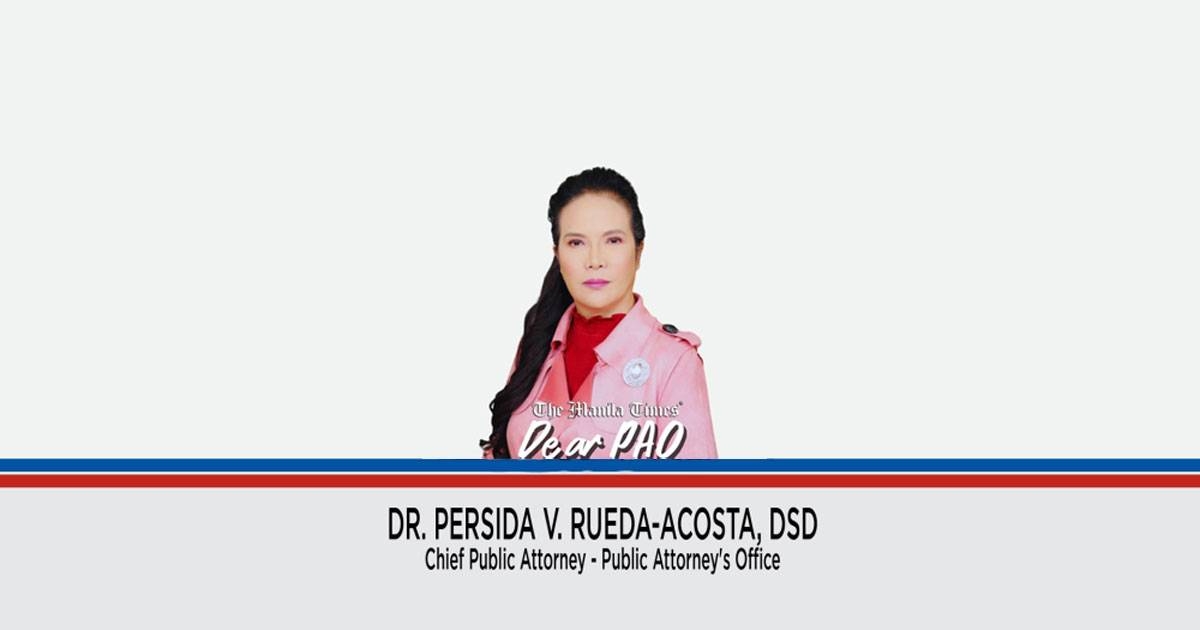
REMEDIES AGAINST CHARGING MULTIPLE CRIMES IN SINGLE COMPLAINT
Dear PAO,
I saw the news about a case involving X, who faces accusations of sexual abuse. It appears that although only one complaint was filed by the prosecutor, X is charged with two crimes within the same complaint. A foreign friend said that such a practice is prohibited in their country. Do we have the same "rule"? I'm seeking clarity on our laws because I'm concerned about fairness for X in this situation. Is there a remedy available to him?
Bruce
Dear Bruce,
Under our rules, a complaint or information against an accused should only charge one offense. If the accused committed two or more offenses, there must be a separate complaint or information for each offense unless the applicable law permits a single punishment for various offenses. This is explicitly provided under Section 13 of Rule 110 of the Revised Rules of Criminal Procedure, which states:
"Section 13. Duplicity of the offense. – A complaint or information must charge but one offense, except when the law prescribes a single punishment for various offenses."
The foregoing provision is in line with the Constitutional guarantee of the accused's right to be informed. Section 14, Article III of the 1987 Philippine Constitution specifically states:
"Section 14. (1) x x x
"(2) In all criminal prosecutions, the accused shall be presumed innocent until the contrary is proved, and shall enjoy the right to be heard by himself and counsel, to be informed of the nature and cause of the accusation against him, to have a speedy, impartial, and public trial, to meet the witnesses face to face, and to have compulsory process to secure the attendance of witnesses and the production of evidence in his behalf. x x x" (Emphasis supplied)
Assuming that X is indeed being charged for two crimes in a single complaint or information and the law applicable in his situation does not permit a single punishment for various offenses, his remedy is to file a motion for a bill of particulars, or he may file a motion to quash. Both remedies are provided for under the Revised Rules of Criminal Procedure. To be specific, Section 9 of Rule 116 and Sections 1 and 3 (f) of Rule 117 state that:
"RULE 116
"Arraignment and Plea
"x x x
"Section 9. Bill of particulars. – The accused may, before arraignment, move for a bill of particulars to enable him properly to plead and to prepare for trial. The motion shall specify the alleged defects of the complaint or information and the details desired.
"RULE 117
"Motion to Quash
"Section 1. Time to move to quash. – At any time before entering his plea, the accused may move to quash the complaint or information x x x
"Section 3. Grounds. – The accused may move to quash the complaint or information on any of the following grounds: x x x
"(f) That more than one offense is charged except when a single punishment for various offenses is prescribed by law; x x x"
It is very crucial for X to avail of any of these remedies because failure on his part to do so would result in a waiver thereto. Corollary, X may be convicted for the crimes that are sufficiently stated in the complaint. As explained by the Supreme Court, through Associate Justice Jhosep Lopez, in the case of People of the Philippines v. XXX (GR 240750, June 21, 2021):
"The prohibition of filing an information with multiple offenses is predicated in the protection of the constitutional right of the accused to be properly informed of the nature and cause of the accusation. If two or more offenses are alleged in the information, the remedy of the accused is to file a motion to quash as provided in Section 3(f),16 Rule 117 of the 2000 Rules on Criminal Procedure. The failure to object to the information before the arraignment would result in a waiver to challenge the procedural infirmity. As in this case, the accused-appellant failed to file a motion to quash the Information. Thus, the CA correctly convicted him of Statutory Rape and Rape by sexual assault.
"Further, the accused-appellant could also file a motion for bill of particulars, if he felt that the allegations in the information are vague, to enable him to properly plead and prepare for trial. Unfortunately, the accused-appellant did not avail of these procedural remedies. On the contrary, he actively participated in the trial. Hence, he is estopped to challenge the defective information." (Emphasis supplied)
We hope that we were able to answer your queries. Please be reminded that this advice is based solely on the facts you have narrated and our appreciation of the same. Our opinion may vary when other facts are changed or elaborated on.
Editor's note: Dear PAO is a daily column of the Public Attorney's Office. Questions for Chief Acosta may be sent to [email protected]
2024-07-05T16:14:08Z dg43tfdfdgfd